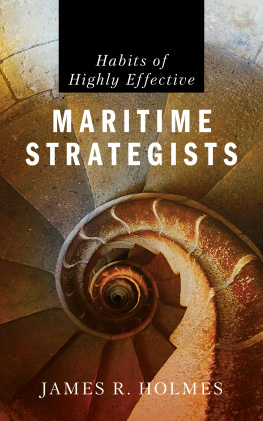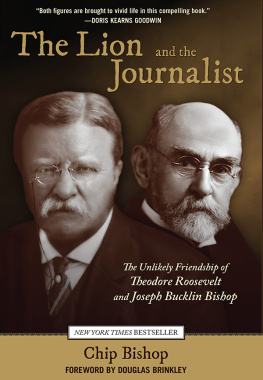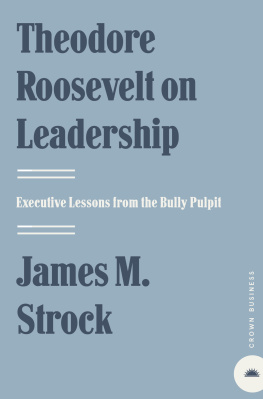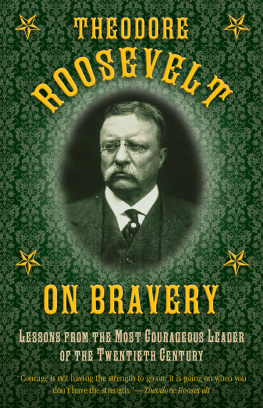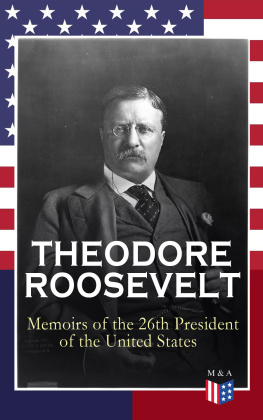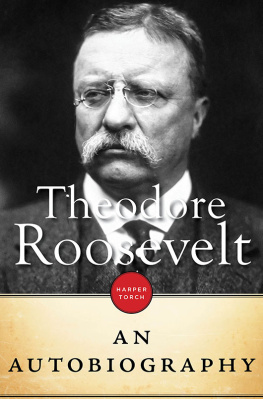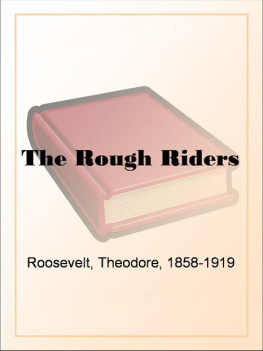THEODORE
ROOSEVELT
AND WORLD ORDER
Other History and International Relations Titles from Potomac Books
Napoleons Troublesome Americans: Franco-American Relations, 18041815 by Peter P. Hill
The First Resort of Kings: American Cultural Diplomacy in the Twentieth Century by Richard T. Arndt
Crisis and Crossfire: The United States and the Middle East since 1945 by Peter L. Hahn
THEODORE
ROOSEVELT
AND WORLD ORDER
Police Power in International Relations
James R. Holmes

Copyright 2006 by Potomac Books, Inc.
Published in the United States by Potomac Books, Inc. All rights reserved. No part of this book may be reproduced in any manner whatsoever without written permission from the publisher, except in the case of brief quotations embodied in critical articles and reviews.
Library of Congress Cataloging-in-Publication Data
Holmes, James R., 1965
Theodore Roosevelt and world order : police power in international relations / James R. Holmes. 1st ed.
p. cm.
Includes bibliographical references and index.
ISBN 1-57488-883-8 (hardcover : alk. paper)
1. Roosevelt, Theodore, 18581919Political and social views. 2. Roosevelt, Theodore, 18581919Philosophy. 3. United StatesForeign relations19011909. 4. United StatesForeign relations19011909Case studies. 5. Police powerUnited StatesHistory20th century. 6. Intervention (International law)History20th century. 7. World politics19001918. 8. World politics19001918Case studies. I. Title.
E757.H65 2005
327.73009041dc22
2005024062
Printed in the United States of America on acid-free paper that meets the American National Standards Institute Z39-48 Standard.
Potomac Books, Inc.
22841 Quicksilver Drive
Dulles, Virginia 20166
First Edition
10 9 8 7 6 5 4 3 2 1
CONTENTS
1
INTRODUCTION
Aggressive fighting for the right is the noblest sport the world affords.
Theodore Roosevelt, Municipal Administration: The New York Police Force
Why intervene overseas? How should America go about diplomatic and military intervention? These questions vexed practitioners and students of American foreign policy throughout the 1990s, when the collapse of the Soviet Union removed both the primary threat to the West and a stabilizing influence in the less-developed world. The September 11, 2001, terrorist attacks and the ensuing global war on terror injected additional urgency into the debate over intervention. Was America now at war with an irregular armed force and its state sponsors, or was the counterterrorist campaign an exercise in global law enforcement, connoting judicial remedies for international violence? By what right could the nation prosecute such a campaign on the soil of sovereign nations? The effort to settle these matters was not merely of academic interest but also carried consequences of the utmost gravity.
The international communityroughly speaking, sovereign states and the organizations pledged to uphold international peace and securityhas found it difficult to forge a consensus on the best way to restore a just order in states saddled with failed or abusive governments. Fueling this indecision is a tension within Article 2(7) of the United Nations Charter, which forbids the organization from intervening in matters which are essentially within the domestic jurisdiction of any state while exempting enforcement measures carried out under Chapter VII. The inability of the international community to strike a balance between the competing requirements of Article 2(7) has muddied discussions of international intervention. Article 53, which explicitly prohibits regional action without Security Confusion over these articles has inhibited efforts to curb abuses in countries ranging from Bosnia to Rwanda to Sudan. The need for a set of principles to guide American and international decision making in these areas has become abundantly clear.
Outside intervention to shield populations from ineffective or abusive rulers has a long pedigree on the theoretical plane, if not in execution. History thus may be of help in solving todays quandaries. As early as the seventeenth century, Hugo Grotius, building on earlier work by the just-war theorists, sketched a rationale for humanitarian war. The last and most far-reaching reason for going to war to help others is the common tie of humanity, wrote the great legal theorist. There is also the problem whether a war is lawful which is undertaken to protect the subjects of another ruler from oppression by him. But where there is manifest oppression, where a [tyrant] uses his power over his subjects in ways odious to every just man, his people will not be denied the right of all human society. Grotius maintained, furthermore, that the principle of intervention remained valid despite the prospect of outsiders using lofty ideals as a pretext to work mischief in neighboring states. Any principle might be misused, he argued; that was no excuse for apathy or inaction.
For the foreseeable future the question of international intervention will remain, by and large, a question of the uses of American power. Yet discourse about U.S. strategic doctrine has been largely bereft of historical contenta striking shortfall considering the impressive collection of minds that has engaged this subject over the past decade. To provide a fresh perspective on the use of American power in the early twenty-first century, this book investigates the diplomacy of the early twentieth century. Theodore Roosevelt, U.S. president from 1901 to 1909, confronted a security milieu that had many traits in common with that of today: rapid economic integration, governments that were unable or unwilling to discharge their duties toward foreigners and their own citizens, and even a loose equivalent of todays terrorist networks, in the form of an international anarchist movement that felled Roosevelts predecessor, William McKinley. Who better to consult on the proper uses of American power than Roosevelt? Few practical statesmen have written more extensively or more thoughtfully on foreign policy than TR, or have bequeathed a well-crafted political philosophy for contemporary use. His meditations on diplomacy and military affairs could furnish a model for American strategic doctrine in the present era. In short, the Roosevelt era bears examining as the United States mulls its role in a world awash in religious and ethnic passions, terrorism, the wholesale failure of states, and exotic weaponry.
In an effort to cope with what might be called failed states, Roosevelt, an avowed interventionist, fashioned an international police power. Strikingly, he grafted the police power onto the Monroe Doctrine, that venerable principle of U.S. foreign relations that sought to deter European territorial aggrandizement in the New World. His Roosevelt Corollary to the doctrine gave the police power both a preemptive and a defensive hue. Chronic wrongdoing, or an impotence which results in a general loosening of the ties of civilized society, he proclaimed in his December 1904 message to Congress, may in America, as elsewhere, ultimately require intervention by some civilized nation, and in the Western Hemisphere the adherence of the United States to the Monroe Doctrine may force the United States, however reluctantly to the exercise of an international police power.
What did Roosevelts words mean? The president, in essence, proposed a humane, disinterested brand of imperialism to displace the self-aggrandizing European variety that drove great-power colonial competition in the late nineteenth century. A former New York City police commissioner, New York state legislator, and U.S. Civil Service commissioner, TR was accustomed to using state power to preserve order and superintend the public welfare. This study argues that he viewed world affairs using the same frame of reference. He asserted that the United States, as the New Worlds leading republic, was endowed with a quasi-legal right to step in and arrange the repayment of foreign debts for Latin American governments that were unable or unwilling to do so. He also claimed the right to perform police duties within Latin American republics that had egregiously failed to secure the blessings of liberty that were enjoyed by Americans for their citizens. Theodore Roosevelts supple doctrine required diplomacy, mediation, finance, law enforcement, and armed force to achieve these aims.
Next page

